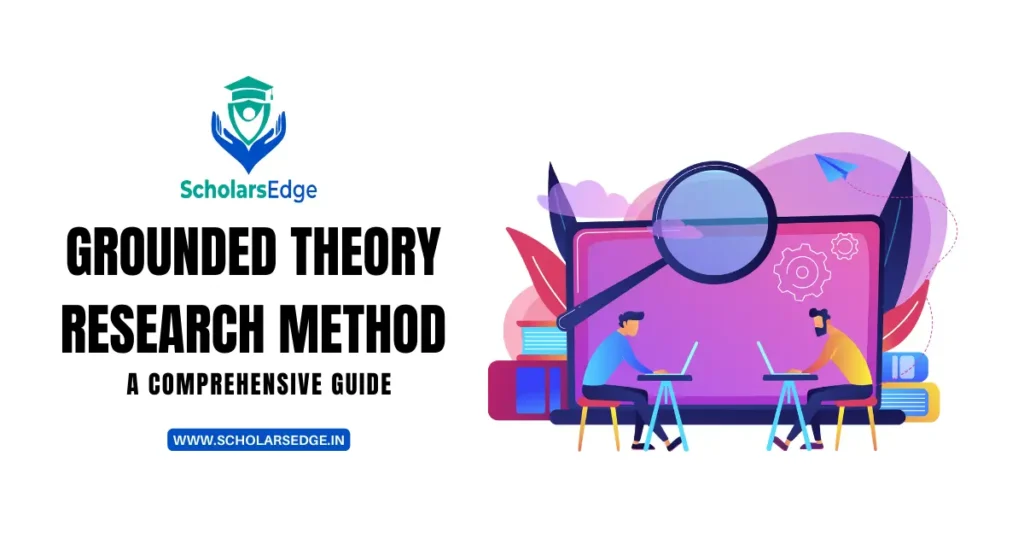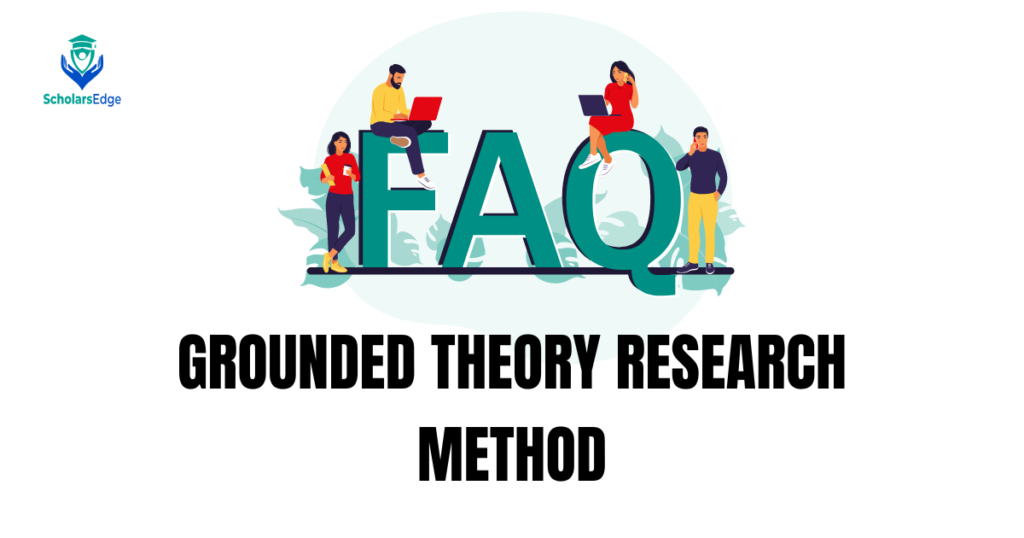
Grounded theory, a powerful research method, provides a systematic yet flexible approach for analysing qualitative data. If you are delving into the world of qualitative research, understanding the grounded theory is essential. In this blog, we will unravel the principles behind grounded theory, explore its applications, and guide you through implementing it in your research.
What is Grounded Theory?
Grounded theory, developed by sociologists Barney Glaser and Anselm Strauss in the 1960s, is a research methodology that aims to develop theories grounded in data. Unlike traditional methods, which start with a hypothesis, grounded theory begins with data collection and uses that data to form a theory.
Key Principles
- Data-driven: This theory emerges from the data, not from preconceived hypotheses.
- Iterative Process: Data collection and analysis occur simultaneously, allowing for continuous refinement of the theory.
- Theoretical Sampling: Data are collected based on emerging theories, focusing on relevance and depth.
Why Use Grounded Theory?
Grounded theory is particularly useful when exploring new areas where existing theories may not fully explain the phenomena. It’s commonly used in social sciences, nursing, education, and other fields where understanding human experiences and behaviours is crucial.
Benefits
- Flexibility: Adaptable to various research contexts.
- Rich Data Analysis: Provides deep insights into complex processes.
- Theory Generation: Leads to the development of new theories.
How to Implement Grounded Theory in Your Research
Step 1: Data Collection
Start by gathering qualitative data through interviews, observations, or document analysis. It’s important to remain open and avoid forming initial hypotheses.
Step 2: Initial Coding
Begin coding your data line-by-line. Look for recurring themes, phrases, or concepts. This initial coding helps break down data into manageable pieces.
Step 3: Focused Coding
Move from initial codes to more focused coding. Identify significant patterns and group similar codes into categories. This step is about refining and distilling the data.
Step 4: Memo-Writing
Memo-writing is a crucial part of grounded theory. Write reflective notes about the codes, categories, and their relationships. This process aids in developing deeper insights and forming the backbone of your emerging theory.
Step 5: Theoretical Sampling
As your theory begins to take shape, engage in theoretical sampling. Collect additional data that can expand, refine, or challenge your developing theory. This step ensures your theory is grounded in diverse and comprehensive data.
Step 6: Constant Comparison
Compare new data with existing codes and categories continuously. This iterative process helps in refining categories and establishing solid connections between them.
Step 7: Theoretical Saturation
Reach a point where new data no longer adds significant insights to your categories. This indicates theoretical saturation, meaning your theory is well-developed and robust.
Step 8: Integration and Theory Formation
Integrate your categories into a cohesive theory. Write up your findings, ensuring that your theory is grounded in the data and provides a meaningful explanation of the studied phenomena.
Applications of Grounded Theory
Social Sciences
Grounded theory is widely used in sociology to explore social interactions, behaviours, and cultural phenomena. It helps in understanding the complexities of social life.
Nursing and Healthcare
In healthcare, grounded theory is valuable for exploring patient experiences, healthcare practices, and the dynamics within healthcare settings. It contributes to developing patient-centred care models and improving healthcare delivery.
Education
Educational researchers use grounded theory to investigate teaching methods, learning experiences, and academic policies. It aids in developing theories that can enhance educational practices and policies.
Business and Management
In the business world, grounded theory helps in understanding organisational behaviour, leadership styles, and market dynamics. It provides insights that can inform business strategies and management practices.
Tips for Effective Grounded Theory Research
Maintain Flexibility
Be open to where the data leads you. Grounded theory thrives on flexibility and the ability to adapt as new insights emerge.
Engage in Reflexivity
Reflect on your role as a researcher and how your perspectives might influence the research process. Reflexivity helps in maintaining objectivity and depth in your analysis.
Use Visual Tools
Diagrams, flowcharts, and concept maps can help visualise relationships between categories and enhance your understanding of the emerging theory.
Collaborate
Engage with other researchers or participants in your study. Collaboration can provide new perspectives and enrich your analysis.
Stay Organized
Keep detailed records of your data, codes, memos, and reflections. Organisation is key to managing the iterative nature of grounded theory research.
Conclusion
Grounded theory offers a robust and flexible approach to qualitative research, enabling researchers to develop theories that are deeply rooted in data. Whether you’re exploring social interactions, healthcare practices, or educational experiences, grounded theory can provide valuable insights and contribute to theory development in your field.
By following the steps outlined in this guide and maintaining a reflexive and flexible approach, you can effectively implement grounded theory in your research. Embrace the iterative process, stay organised, and let the data guide your journey to uncover meaningful theories.
FAQs on Grounded Theory Research Method

What are the guidelines for grounded theory?
Grounded theory involves several key guidelines to ensure rigorous and systematic research. Simultaneous data collection and analysis are fundamental, allowing the researcher to refine and direct the research process continuously. Theoretical sampling is employed to select participants and data sources based on emerging concepts, ensuring the theory is well-grounded in the data. The coding process involves open, axial, and selective coding to identify and categorise themes and relationships within the data. The constant comparative method is used to compare data segments to find similarities and differences, aiding in theory development. Memo writing is an essential practice where researchers document their thoughts, ideas, and theoretical connections throughout the research process. Data collection continues until theoretical saturation is reached, meaning no new concepts emerge. The integration of concepts into a coherent theoretical framework is crucial to provide a comprehensive explanation of the phenomena under study.
What is grounded theory in research?
Grounded theory is a qualitative research methodology designed to generate theories from systematically gathered and analysed data. Developed by Glaser and Strauss in the 1960s, it focuses on creating a theory that is grounded in actual data rather than testing preconceived hypotheses. Researchers begin with data collection and follow iterative cycles of data analysis, coding, and theory development until they achieve theoretical saturation. This methodology ensures that the resulting theory is closely aligned with the observed reality, providing a robust and empirical foundation for understanding complex phenomena.
What are the characteristics of grounded theory?
Several distinct features characterise grounded theory. It adopts an inductive approach, where theory emerges directly from the data. The research process is iterative, involving repetitive cycles of data collection and analysis to refine concepts and develop a comprehensive theory. Flexibility is a key characteristic, allowing researchers to adapt and modify their research focus based on emerging data. The coding process is systematic, utilising open, axial, and selective coding to categorise and relate data. Constant comparison of data segments helps identify patterns and relationships, while memo writing documents thoughts, hypotheses, and theoretical ideas throughout the research. Theoretical sampling is strategically employed to explore and refine emerging concepts, and data collection continues until theoretical saturation is achieved. Finally, the integration of concepts into a coherent theoretical framework ensures that the theory provides a comprehensive and well developed explanation of the studied phenomenon.
